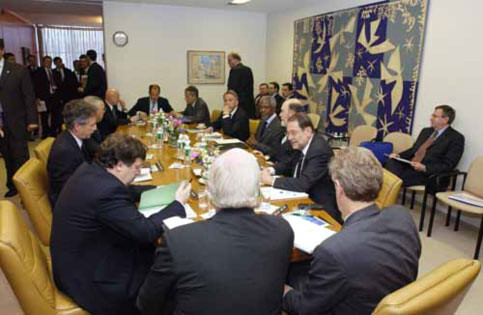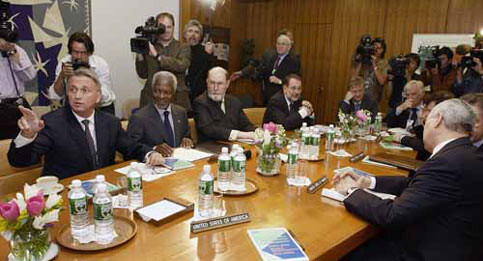4 May 2004

View of today’s Quartet meeting. (UN/Eskinder Debebe)
Meeting today at United Nations Headquarters in New York, the so-called Quartet issued a positive reaction to Prime Minister Ariel Sharon’s plan to withdraw all Israeli settlements from Gaza and parts of the West Bank, calling it a “rare moment of opportunity” and a possible restart to its Road Map peace plan for the Middle East.
In a communiqué read by UN Secretary-General Kofi Annan after their meeting, the United Nations, European Union (EU), Russian Federation and United States said they “took positive note” of Prime Minister Sharon’s announced intention to withdraw Israeli settlements, a plan that Israel’s Likud party rejected in a referendum Sunday.
“This should provide a rare moment of opportunity in the search for peace in the Middle East,” the Quartet said. “This initiative, which must lead to a full Israeli withdrawal and complete end of occupation in Gaza, can be a step towards achieving the two-state vision; and could restart progress on the Road Map.” That plan calls for Israel and the Palestinians to take a series of parallel and reciprocal confidence-building measures leading to two states living side-by-side in peace by 2005.
The group noted, however, “that no party should take unilateral actions that seek to predetermine issues that can only be resolved through negotiation and agreement between the two parties” and that “any final settlement on issues such as borders and refugees must be mutually agreed to by Israelis and Palestinians.”
Also attending today’s meeting were US Secretary of State Colin Powell, Russian Foreign Minister Sergey Lavrov, Foreign Minister Bryan Cowan of Ireland, which currently holds the EU’s rotating presidency, EU High Representative Javier Solana and EU External Relations Commissioner Chris Patten.
In announcing its agreement to set up an “appropriate coordinating and oversight mechanism” on the implementation of the Road Map, the Quartet pledged to work quickly to ensure that the humanitarian needs of Palestinians were met. The group also said it was prepared to engage with a “responsible and accountable” Palestinian leadership, committed to reform and security performance.
“We will seek to ensure that arrangements are put in place to ensure security for Palestinians and Israelis, as well as freedom of movement, and greater mobility and access, for Palestinians,” the Quartet added.
The Quartet also underscored the importance of effective security arrangements to any possibility of progress, saying that Palestinian security services should be restructured and retrained to provide law and order and security to the Palestinians, and to end terror attacks against Israel.
“While recognizing Israel’s legitimate right to self-defence in the face of terrorist attacks against its citizens, within the parameters of international humanitarian law, we call on the Government of Israel to exert maximum efforts to avoid civilian casualties,” it said, also calling on the Government of Israel to take all possible steps to ease the humanitarian and economic plight of the Palestinian people.

Quartet meeting today, with Secretary-General Kofi Annan seated left centre. (UN/Eskinder Debebe)
Secretary-General’s opening statement at press conference following “Quartet” meeting
NEW YORK, 4 May 2004
Good afternoon, Ladies and Gentlemen. Thank you for waiting. Let me now read you what the Quartet has agreed:
We reaffirm our commitment to our shared vision of two states living side by side in peace and security. One of those states will be Israel and the other a viable, democratic, sovereign and contiguous Palestine.
We call on both parties to take steps to fulfil their obligations under the roadmap, as called for in Security Council resolution 1515 and in our previous statements, and to meet the commitments they made at the Red Sea Summits in Aqaba and Sharm el Sheikh.
In that context, we welcome the Israeli government’s recent reaffirmation of its readiness to implement certain obligations under the roadmap, including progress towards a freeze on settlement activity. We urge the Israeli government to implement these commitments, and to fully meet its roadmap obligations.
We view the present situation in the Middle East with great concern. We condemn the continuing terror attacks on Israel, and call on the Palestinian Authority to take immediate action against terrorist groups and individuals who plan and execute such attacks.
While recognizing Israel’s legitimate right to self-defence in the face of terrorist attacks against its citizens, within the parameters of international humanitarian law, we call on the Government of Israel to exert maximum efforts to avoid civilian casualties.
We also call on the Government of Israel to take all possible steps now, consistent with Israel’s legitimate security needs, to ease the humanitarian and economic plight of the Palestinian people, including increasing freedom of movement for people and goods both within and from the West Bank and Gaza, removing checkpoints, and other steps to respect the dignity of the Palestinian people and improve their quality of life.
The Government of Israel should take no actions undermining trust such as deportation, attacks on civilians, confiscation and/or demolition of Palestinian homes and property, and other measures specified in the Tenet work plan. The Quartet calls for renewed efforts to reach a comprehensive ceasefire as a step towards dismantlement of terrorist capabilities and infrastructure, and renewed progress towards peace through implementation of the roadmap.
We note the Government of Israel’s pledge that the barrier is a security rather than a political barrier and should be temporary rather than permanent. We continue to note with great concern the actual and proposed route of the barrier, particularly as it results in the confiscation of Palestinian land, cuts off the movement of people and goods, and undermines Palestinians’ trust in the roadmap process by appearing to prejudge the final borders of a future Palestinian state.
We took positive note of Prime Minister Sharon’s announced intention to withdraw from all Gaza settlements and parts of the West Bank. This should provide a rare moment of opportunity in the search for peace in the Middle East. This initiative, which must lead to a full Israeli withdrawal and complete end of occupation in Gaza, can be a step towards achieving the two-state vision; and could restart progress on the roadmap.
We further note that any unilateral initiatives by the Government of Israel should be undertaken in a manner consistent with the roadmap, and with the two-state vision that underlies the roadmap. We reaffirm President Bush’s June 24, 2002 call for an end to the Israeli occupation that began in 1967, through a settlement negotiated between the parties.
We also note that no party should take unilateral actions that seek to predetermine issues that can only be resolved through negotiation and agreement between the two parties.
Any final settlement on issues such as borders and refugees must be mutually agreed to by Israelis and Palestinians, based on Security Council resolutions 242, 338, 1397 and 1515, the terms of reference of the Madrid peace process, previous agreements, and the initiative of Saudi Crown Prince Abdullah endorsed by the Beirut Arab League Summit. It must also be consistent with the roadmap.
We have agreed to undertake the following steps, with appropriate mechanisms established to monitor progress and performance by all sides:
We will act on an urgent basis, in conjunction with the World Bank, the UN Special Coordinator (UNSCO) and the Ad-hoc Liaison Committee (AHLC), on the basis of a World Bank/UNSCO rapid-assessment study, to ensure that Palestinian humanitarian needs are met, Palestinian infrastructure is restored and developed, and economic activity is reinvigorated.
We are prepared to engage with a responsible and accountable Palestinian leadership, committed to reform and security performance. The Quartet members will undertake to oversee and monitor progress on these fronts.
We will seek to ensure that arrangements are put in place to ensure security for Palestinians and Israelis, as well as freedom of movement, and greater mobility and access, for Palestinians. We underscore the need for agreed, transparent arrangements with all sides on access, mobility and safety for international organizations, and for bilateral donors and their personnel.
As Israel withdraws, custody of Israeli-built infrastructure and land evacuated by Israel should be transferred, through an appropriate mechanism, to a reorganized Palestinian Authority, which – in coordination with representatives of Palestinian civil society, the Quartet, and other representatives of the international community – will as quickly as possible determine equitable and transparent arrangements for the ultimate disposition of these areas.
Effective security arrangements continue to be critical to any possibility of progress. Palestinian security services should be restructured and retrained, consistent with the roadmap, to provide law and order and security to the Palestinians, and to end terror attacks against Israel.
Finally, we reaffirm our commitment to a just, comprehensive, and lasting settlement to the Arab-Israeli conflict, based on Resolutions 242 and 338. We remind all parties of the need to take into account the long-term consequences of their actions, and of their obligation to make rapid progress toward resumption of a political dialogue.
An appropriate coordinating and oversight mechanism will be established, under the Quartet’s authority.
We call on all states in the region to exert every effort to promote peace and to combat terrorism.
Thank you very much. We will now take your questions.
Related Links